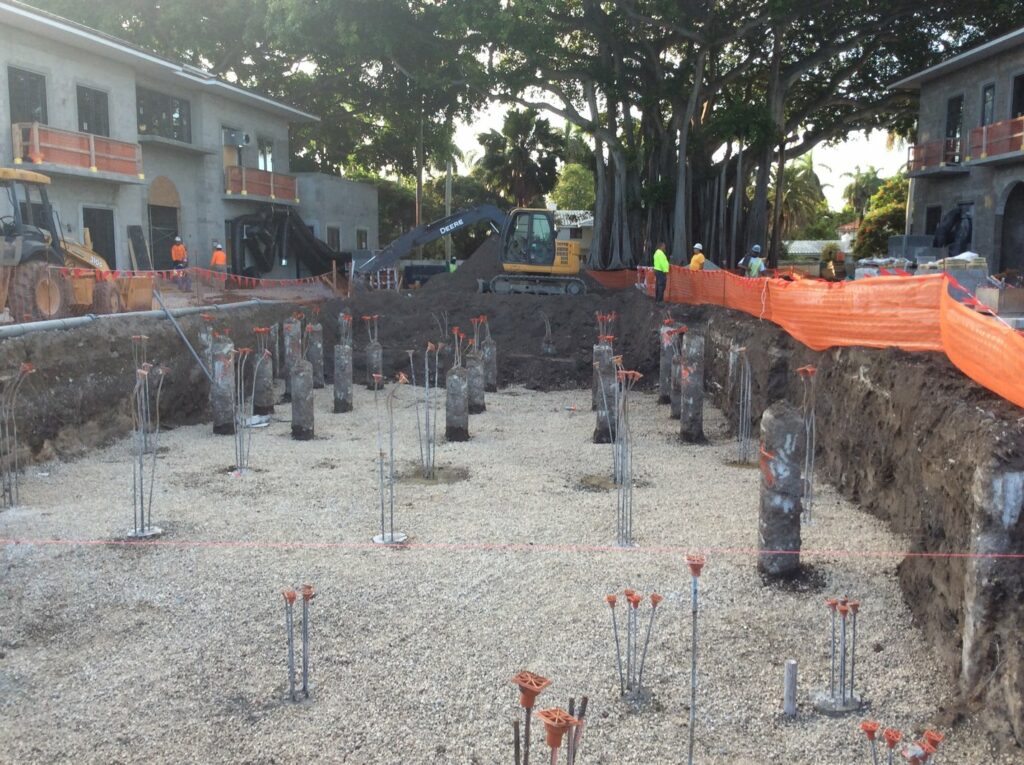ou’re planning a swimming pool for your South Florida property, and you hired a pool provider to design and install it. But then the subject of pool pilings comes up. Will this mean more approvals and more cost? (Is the pool even possible?)
What you might want to know is: Will your South Florida swimming pool need pilings, and what does this mean?
We deal with this question all the time in Miami and The Keys. About half of the pools in South Florida that we build do need pilings. Because of our coastal environment in South Florida, we find silty beach sand, water, and even limerock. Knowing the soil composition before starting any pool construction project is critical. Once we find out the exact makeup of the soil at the proposed site, we might need to add support to the pool’s concrete foundation with pilings.
Some pools require a couple of pilings to support the infrastructure—others need dozens. It all depends on the soil, the size of your pool, and the load that the concrete structure will bear.
So, let’s talk about how we determine whether swimming pool pilings are a must for your South Florida pool project, and what this could mean in terms of cost.
what exactly are swimming pool pilings?
Pool piling can consist of concrete, wood, or steel that is driven into the ground or cast in place. Some South Florida pools will call for helical piles, which are made of steel and bored into the ground using an auger. Concrete piling for swimming pools can be poured and tend to be less expensive. The type of pool pilings required is identified in an engineer’s soil boring test report and is based on the soil composition and swimming pool design.

soil boring test: finding out what’s underground
Local contractors, architects, and engineers may claim to have some knowledge of soil conditions, but a soil boring test is the first step to finding out if your swimming pool will need pilings to support the shell. We’re talking about tons of water—a significant load. It’s essential to find out the soil makeup so we can ensure the quality, integrity, and sustainability of the pool. Otherwise, you could be in for costly repairs or a complete failure.
At Reef Pool Builders, we retain engineering consultants who specialize in soil boring tests and produce written reports detailing the soil composition and recommendations to share with the engineer.
What is a soil boring test like? It involves drilling an auger 30 feet deep into the ground. A core sample is taken and analyzed. This is how we find out what’s underground.
For example, a soil boring test might reveal topsoil and grass up to 6 inches deep, followed by beach sand down to 3 feet. Twenty feet below the surface, we could find rock fragments or limerock. Also, it’s not unusual to run into water. (Makes sense since we are surrounded by water here in South Florida.)

Based on these findings, the engineer’s report will say whether the proposed pool structure needs “deep foundation systems” to support it. That means pilings. The report will recommend how many and what type of swimming pool pilings are necessary to support the load of the pool.
how much will pool pilings cost?
Anytime you add a structural element to a construction project, the cost will increase. This is also true with swimming pool pilings.
First, the actual soil boring test can cost up to $1,500 depending on the site. Typically, pool pilings cost between $300 to $1,000 per piling, depending on the type of piling and complexity of the project. Auguered piling with steel reinforcement is more typically used than concrete piles. Generally speaking, we find that pool pilings can increase a swimming pool project cost by $5,000 to $15,000. Again, this is an estimate because the expense depends on the number of pilings and materials used.
But here’s the thing: Imagine the cost of not putting in swimming pool pilings. Without structural supports, the load of the pool will force settling and result in serious damage. Basically, swimming pool pilings protect your investment and ensure that the pool is safe, secure, and sustainable so you can enjoy it for decades.
At Reef Pool Builders, we like our pools to be self-supported and separated from other structures, such as decks and homes.

a safe, sound pool—thanks to pilings
At Reef Pool Builders, we work closely with our clients to explain the importance of structural integrity when constructing swimming pools. A cheap fix or shortcut could cost them the entire project. Due diligence and preparation are essential, and this includes enlisting an engineering firm to conduct thorough soil testing.
Let’s talk more about what’s involved in building a beautiful, quality swimming pool. Call us any time at (305) 901-1505, or fill out this simple form and we’ll get in touch with you.


